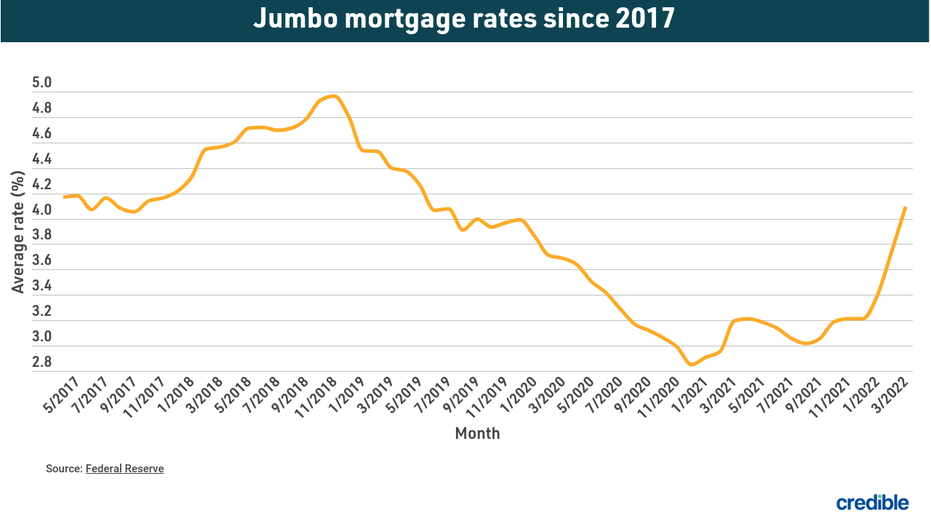Browsing the Jumbo Loan Refine: Expert Tips for Protecting Your Dream Home
Browsing the Jumbo Loan Refine: Expert Tips for Protecting Your Dream Home
Blog Article
Navigating the Jumbo Financing Landscape: Necessary Insights for First-Time Homebuyers
Browsing the intricacies of big car loans provides a distinct collection of challenges for new buyers, especially in a developing genuine estate market. Understanding the essential eligibility needs and possible advantages, alongside the disadvantages, is essential for making notified decisions. Additionally, developing a solid economic method can considerably improve your leads.
Recognizing Jumbo Fundings

Since big loans are not backed by government-sponsored entities, they lug various underwriting standards and need more extensive monetary paperwork. This distinction can bring about greater passion prices contrasted to standard financings, given the enhanced threat to lenders. However, big lendings additionally offer distinct advantages, such as the capacity to fund higher-value residential or commercial properties and potentially a lot more flexible terms.
New property buyers should additionally know that protecting a jumbo car loan often necessitates a larger deposit, commonly varying from 10% to 20%. Furthermore, debtors are usually anticipated to show solid creditworthiness and a steady income to qualify. When discovering jumbo finance options in their search of homeownership., comprehending these subtleties can encourage first-time homebuyers to make informed decisions.
Qualification Needs
Protecting a big finance requires conference details qualification requirements that differ dramatically from those of conventional lendings. Unlike standard loans, which are typically backed by government-sponsored entities, jumbo car loans are not guaranteed or assured, resulting in more stringent standards.
One key demand is a greater credit report. Lenders normally anticipate a minimum rating of 700, although some may enable lower scores under certain problems (jumbo loan). Additionally, debtors must show a robust financial profile, which includes a low debt-to-income (DTI) proportion, generally no higher than 43%. This ensures that consumers can manage their regular monthly repayments along with various other economic obligations.
Furthermore, many loan providers call for significant paperwork, consisting of proof of earnings, asset statements, and tax returns for the previous 2 years. A considerable deposit is also important; while standard loans may permit deposits as low as 3%, jumbo car loans usually demand a minimum of 20%, depending upon the financing and the lender quantity.

Advantages of Jumbo Finances
For many new buyers, big loans use distinct benefits that can help with the trip towards homeownership. One of the key advantages is the capacity to finance residential or commercial properties that exceed the adhering financing restrictions set by government-sponsored entities. This versatility allows customers to access a broader variety of high-value residential properties in affordable actual estate markets.
Furthermore, big lendings frequently come with attractive rates of interest that can be less than those of these details conventional lendings, particularly for borrowers with solid credit score accounts. This can cause substantial financial savings over the life of the financing, making homeownership a lot more budget friendly. Furthermore, jumbo financings commonly allow for greater funding amounts without the requirement for personal mortgage insurance (PMI), which can further reduce monthly payments and general costs.

Prospective Downsides
Numerous potential buyers might find that jumbo fundings featured substantial drawbacks that necessitate careful consideration. One of the main issues is the rigid credentials criteria. Unlike adhering lendings, big loans normally need higher credit rating, often going beyond 700, and substantial earnings documentation, making them much less accessible for some borrowers.
Additionally, big fundings generally include greater rate of interest contrasted to traditional loans, which can lead to increased regular monthly payments and overall borrowing prices. This costs may be particularly troublesome for newbie buyers who are already navigating the financial intricacies of buying a home.
Another significant drawback is the bigger deposit requirement. Lots of lending institutions expect a minimum deposit of 20% or even more, which can posture a challenge for customers with limited financial savings. The absence of federal government backing for big lendings leads to much less favorable terms and problems, boosting the risk for lenders and, consequently, the loaning prices for homeowners.
Lastly, market fluctuations can substantially impact the resale worth of premium buildings financed with big fundings, including an aspect of financial unpredictability that new property buyers might find challenging.
Tips for First-Time Homebuyers
Navigating the intricacies of the homebuying process can be overwhelming for new purchasers, specifically when taking into consideration jumbo car loans (jumbo loan). To simplify this journey, sticking to some essential methods can make a considerable difference
First, enlighten on your own on jumbo fundings and their details requirements. Recognize the different financing standards, consisting of credit report, debt-to-income proportions, and down repayment expectations. Typically, a minimal credit rating of 700 and a down settlement of at least 20% are necessary for authorization.
Second, engage with a well-informed home mortgage specialist. They can provide understandings tailored to your economic situation and help you navigate the complexities of the see page jumbo loan landscape.
Third, think about pre-approval to reinforce your acquiring position. A pre-approval letter signals to sellers that you are a significant purchaser, which can be beneficial in open markets.
Lastly, do not overlook the significance of budgeting. Factor in all expenses linked with homeownership, including real estate tax, upkeep, and homeowners' insurance coverage. By complying with these pointers, new customers can come close to the jumbo financing procedure with better self-confidence and quality, improving their possibilities of effective homeownership.
Verdict
In final thought, browsing the jumbo funding landscape calls for a thorough understanding of qualification requirements, benefits, and possible disadvantages. Inevitably, detailed preparation and education and learning regarding jumbo lendings can lead to more educated decision-making in the homebuying procedure.
When navigating the intricacies of the real estate market, comprehending jumbo loans is critical for newbie buyers aiming for properties that exceed conventional funding limits. Big fundings are non-conforming car loans that commonly go beyond the adhering finance restriction established by the Federal Housing Money Agency (FHFA)Additionally, big finances commonly come with attractive interest prices that can be reduced than those of typical financings, particularly for customers with solid debt accounts. Big financings normally allow for greater lending quantities without the need for exclusive home loan insurance policy (PMI), which can additionally lower overall expenses and regular monthly payments.
Unlike conforming car loans, jumbo fundings commonly call for higher credit score scores, frequently exceeding 700, and considerable income documents, making them much less available for some consumers.
Report this page